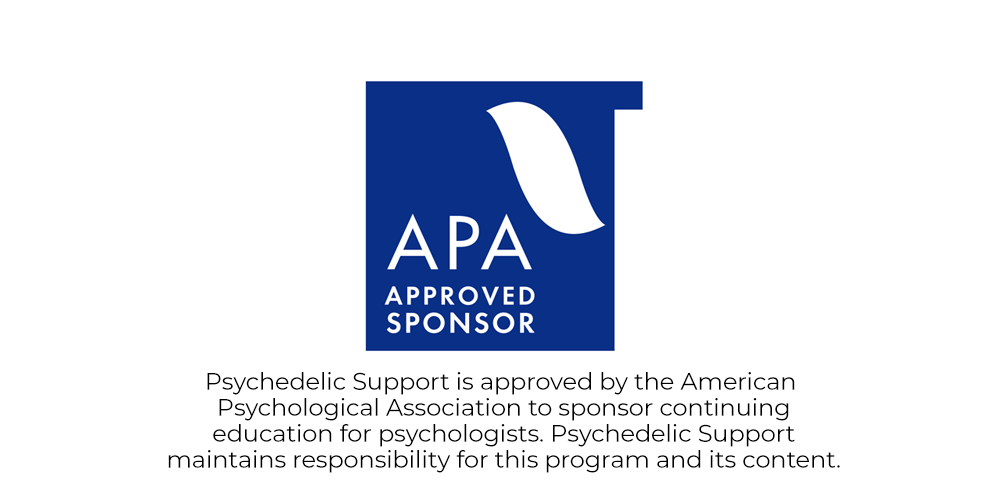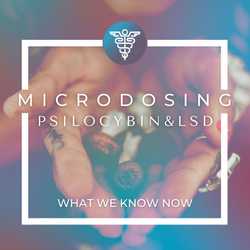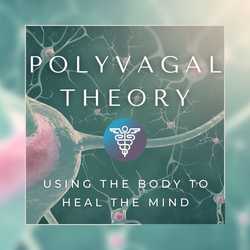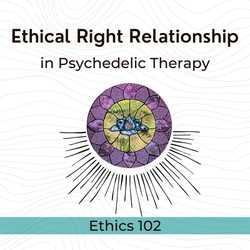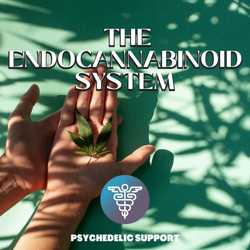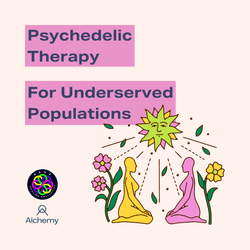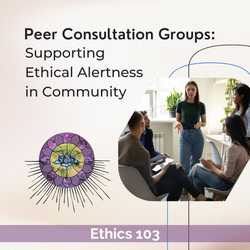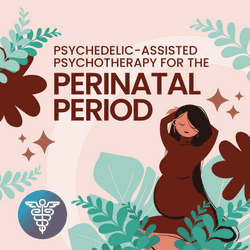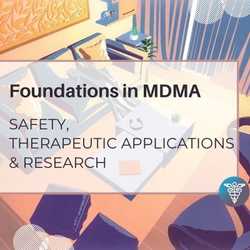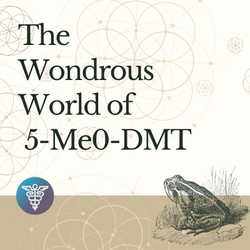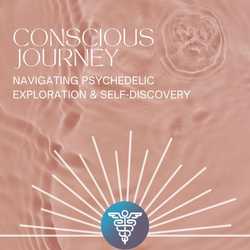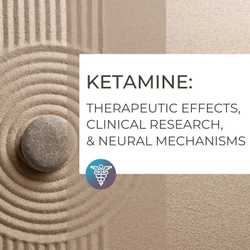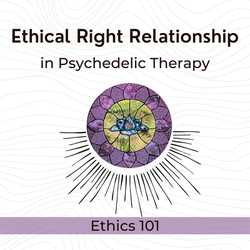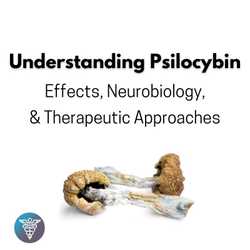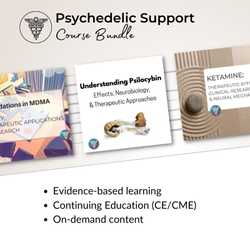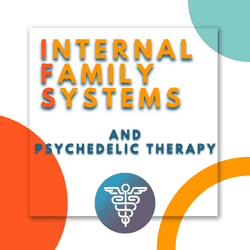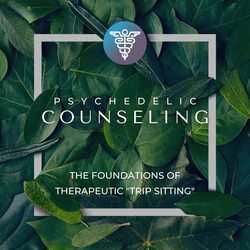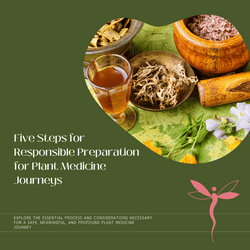Psychedelic Therapy Continuing Education Series
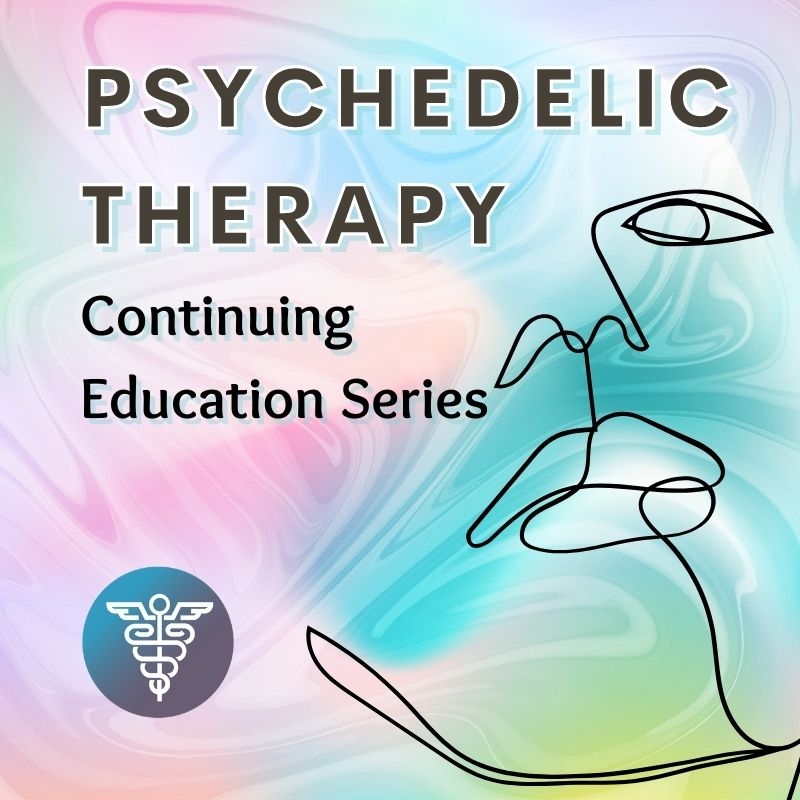
Psychedelic Therapy Continuing Education Series
$0.00
Course Access
Guarantee
Learning
Course Description
The psychedelic medicine field is rapidly evolving. Thanks to modern-day research, our understanding of how psychedelic therapy can be applied to mental health is opening the door for new approaches to wellness.
Each month, we host an expert speaker who shares innovations in psychedelic medicine, best practices for safety and harm reduction, evidence-based therapeutic approaches, research findings, and tips for health professionals working in this field.
Learn how to support your clients and stay up-to-date on the most relevant opportunities for health providers. Chat and network with other attendees through the webinar chat features. We’re here to learn from each other and strengthen our ties as a community.
Join the live monthly event to hear presentations and QA with speakers. Watch the video replays and complete your CE quizzes at any time.
By enrolling in this course, you will receive email invites to join our monthly, live, online events. Live event times vary. Videos of speaker events qualifying for CE credit will be added to the course after each live webinar.
$120 for an annual subscription to all past and future CE webinars!
Course Curriculum
Microdosing Research: The Next Frontier for Clinical Trials and Therapeutics (James Fadiman, PhD)
The term “microdosing” was coined by Dr Jim Fadiman to describe taking very small doses of a psychedelic substance. Many have reported benefits of microdosing for mental health, creativity, and well being. Yet evidence from controlled clinical trials is lacking. In this introductory webinar examine the changing landscape of microdosing research, clinical trials, and the potential applications of microdosing in therapeutic practices.
Psychedelic Law: A Look at Emerging Legal Questions for Clinicians (Serena Wu, JD, BA; Hadas Alterman, JD, BA; Adriana Kertzer, JD, BA)
Plant Medicine Law Group, a group of women lawyers who have crossed the threshold into psychedelic law. Join them in a discussion of Emerging Legal Questions for Clinicians to learn about the landscape of psychedelic law, upcoming changes and what that means for mental health care professionals who are currently practicing psychedelic integration or hope to provide psychedelic-assisted therapy in the future.
Beyond the Narrow Life: A Guide for Psychedelic Integration & Existential Exploration (Kile Ortigo, PhD)
Non-ordinary states of consciousness can elicit profound questions about oneself, the universe, and our place in it. By way of the Hero’s Journey, we explore common topics that emerge during psychedelic journeys and several frameworks for integrating these experiences. Dr Ortigo describes how psychedelic integration practices can draw from evidence-based cognitive-behavioral therapy, Jungian depth psychology, existential philosophy, compassion and mindfulness practices, comparative mythology, pop culture, film, and scientific research. The presentation is an overview of his book Beyond The Narrow Life: A Guide for Psychedelic Integration and Existential Exploration.
After the Ceremony: What Clinicians Need to Know About Ayahuasca Integration (Kerry Moran, MA, LPC, SEP)
Integration is key to helping clients process ayahuasca's transformative experiences. Kerry Moran, MA, LPC, explores how clinicians can support clients post-ceremony, addressing moments of bliss, terror, and unconscious material that arise. This session provides practical guidance on emotional and somatic resourcing to help clients navigate and integrate these intense, often overwhelming experiences into their lives.
- Interested in an ayahuasca integration program? Integrating Ayahuasca is a 10-week online course developed by Kerry Moran to inspire and support your post-ceremony transformation. Each week you’ll receive a link to a new class packed with practical guidance, practices and exercises specifically keyed to integration.
Using Psilocybin Mushrooms in Patients on Antidepressants (Erica Zelfand, ND)
As psychedelic research grows, more clients are looking for relief and questions arise about psilocybin-assisted therapy for clients on antidepressants. Dr. Erica Zelfand explores the interplay between SSRIs and psilocybin, reviewing pharmacology, clinical realities, and emerging research. This session discusses whether clients can safely continue psychiatric medications during psilocybin therapy and how clinicians can navigate these treatment considerations effectively.
Are Psychedelic Medicines Right for my Patient? (Dave Rabin, MD, PhD)
Clinical trials of MDMA- and psilocybin-assisted therapy are investigating these novel treatments for PTSD, depression, eating disorders, anxiety related to life-threatening illness, and addiction disorders. Ketamine is currently prescribed off-label for these conditions, and esketamine is FDA-approved for depression indications. As we anticipate the future of psychedelic medicine, how will clinicians decide what is the best and safest treatment for their patient? Join Dr. Dave Rabin, a board-certified psychiatrist, to explore the safety, effectiveness, and clinical considerations of psychedelic medicines. Learn about drug effects, screening practices, and evaluating risk factors to ensure safe, quality care.
Inbodied Integration: Supporting Clients & Clinicians in Taking Psychedelic Experiences Forward (Lauren Taus, LCSW)
Integration is the name of the game with psychedelic-assisted therapies – and in any enriching experience with a psychoactive medicine. It is essential for any enriching experiences with psychoactive medicine. In order to effectively support others in living the truths that emerge from journeys, every clinician in the field must know the landscape of the medicine that they facilitate, from their own psyche, and know how to make action oriented meaning of what one learns in these spaces. In this webinar, Lauren Taus, LCSW, explores creative, action-oriented approaches to psychedelic integration. Learn how to help clients anchor insights, shift mindsets, and release what no longer serves them, supporting their journey toward freedom, growth, and joy.
Psychedelics & Psychotropics: Drug Interaction and Clinical Approach (Ben Malcolm, PharmD, MPH, BCPP)
Do you understand how psychedelics interact with psychiatric medications? As several psychedelics near clinical trials, it’s crucial for clinicians to grasp key drug interactions. Join educator and psychopharmacological consultant Ben Malcolm, PharmD, MPH, BCPP, as he explores the pharmacokinetics and pharmacodynamics of psychedelics and common psychiatric medications. Watch now for insights on managing clients taking medications incompatible with psychedelic therapies.
The Legal Landscape of Psychedelic Therapy (Hadas Alterman, JD); Adriana Kertzer, JD); Harry Nelson, JD)
The psychedelic renaissance, and the legality of these medicines, is rapidly changing. Therapists, clinicians, providers and policymakers must remain conscientious of this fast moving world. In this introductory webinar, we discuss the current issues surrounding equitable and legal access to psychedelic therapy with Plant Medicine Law Group’s Adriana Kertzer, JD, Hadas Alterman, JD, from APPA, and Harry Nelson, JD, from the largest healthcare and life sciences specialty law firm in Los Angeles. We explore the current legal landscape and discuss how this applies to clinical practice, policy, and research to all become better informed to practice in this emerging psychedelic medicine field.
Prescribing Connection: How Psychedelics Impact Love and Relationships (Molly Maloof, MD)
There’s a lot of talk about the loneliness epidemic, but what if the real epidemic lack of social connection? Your social network matters to your health—online and in real life. Ten percent of women have no close friends. Fifteen percent of men have no close friendships at all, a fivefold increase since 1990. When was the last time you thought about how your social life, your sex life, your romantic life, and your family life affect your health and happiness? Join Dr. Molly Maloof, healthspan expert and founder of Adamo Biosciences, for a discussion on how psychedelics can enhance social connection and address ethical challenges in couples' therapy. Explore relationships, trauma healing, and how psychedelics can extend healthspan.
The Need for Anti-Racist Training in Psychedelic Therapy (Darron Smith, PhD, PA-C, DFAAPA)
Watch a conversation with Dr Darron Smith, MAPS-trained therapist, physician’s assistant, educator, and researcher, about anti-racist considerations for psychedelic-assisted therapists (PATs) to practice when holding space for Black, Indigenous, and People of Color. Here, we discuss how microaggressions and biases continue to inform how white people show up to interact with BIPOC individuals in the emerging field of psychedelic therapy.
Holistic Addiction Recovery with Psychedelics & Interdisiplinary Modalities (Celina De Leon, M.Div)
Listen to a conversation about why entheogenic plant medicines such as ayahuasca–when combined with other therapeutic and recovery modalities—can be effective in ways that conventional approaches may not be. We discuss how addiction is a complex condition of body, mind, human relations, and spirit. In the pursuit of reward—the relief of pain, unresolved emotional experiences, and trauma—the elements of nature, nurture, and choice become tragically misaligned.
- Natura Care Programs: Discover an interdisciplinary approach to addiction recovery offered by innovative non-profit program, Natura Care Programs (NCP). NCP offers a 3-month, interdisciplinary addiction recovery program blending ayahuasca ceremonies, nature immersion, contemplative practice, counseling, and peer support. By addressing the complexities of addiction, NCP provides holistic, individualized integration and preparation to support long-term recovery.
Psychedelics for Women's Health (Allison Feduccia, PhD)
Interactions between hormones and neurotransmitters affect many aspects of our mental well-being and health. Could psychedelic medicines become a treatment strategy for women's health issues? Join Psychedelic Support co-founder and neuropharmacologist Dr Allison Feduccia, PhD, for a presentation on the science of hormones and neurotransmitters, health challenges across the life cycle, and why psychedelic medicines could become treatment options for premenstrual symptoms, sexual health, postpartum depression, menopause, and end-of-life care. Learn about the research behind these advances and takeaways for women who are searching healing through psychedelic medicine.
Family Matters in Psychedelic Therapy (Adele Lafrance, PhD)
Family members and/or close others represent an often-untapped resource for enhancing change in individuals engaged in psychedelic psychotherapy. Providing a supportive other with an active role in the healing process can also decrease their feelings of anxiety, powerlessness, and even paralysis states that can contribute to systemic difficulties, especially as the healing work disrupts old patterns. Join clinical psychologist Adele Lafrance, PhD, for a discussion on the ethical, neurobiological, and psychological aspects of involving others in psychedelic-assisted healing. Learn how shared experiences can foster growth in close relationships, the most fertile ground for healing.
Q&A with Psychedelic Therapy Legal Experts (Adriana Kertzer, JD; Deborah Linden Saly, JD; Harry Nelson, JD)
The legal landscape of psychedelic therapies has been evolving rapidly. As scientific evidence grows, governments are reevaluating their policies, aiming to strike a balance between patient safety and expanding the potential benefits of psychedelic-assisted therapies. Listen to a Q&A about the current issues around legal access to psychedelic therapy with Adriana Kertzer, JD, Deborah Linden Saly, JD, and Harry Nelson, JD. These expert attorneys discuss navigating legal challenges around plant medicines and how to become better informed to practice in this emerging psychedelic medicine field.
EMBARK Psychedelic Therapy: A New Approach for the Whole Person (Alex Belser, PhD)
Join Dr Alex Belser, PhD, and explore EMBARK Psychedelic Therapy for Depression. This innovative model provides clinicians with a new framework for psychedelic-assisted therapy, addressing gaps in existing treatments for depression. EMBARK emphasizes trauma-informed, culturally competent, and ethical care, integrating six clinical domains and twelve therapeutic change mechanisms. Open-sourced, it encourages the evolution of psychedelic therapy across diverse contexts and populations.
Truth Medicine: A Nondual Approach to Psychedelic Psychotherapy (Michael Sapiro, PsyD)
Join Dr Michael Sapiro as he walks us through Nondual Psychedelic Psychotherapy, where he explores the power of unconditional self-love as the core of healing. Discovering, accessing, and applying love toward one’s self is the essence of the nondual approach to psychedelic psychotherapy. In this approach, we start from this place of inner goodness, innocence, ease, and peace and work our way through the layers of trauma, shame, and untended grief with love as the healing balm. Dr. Sapiro shares nondual meditation techniques, case studies, and therapeutic methods, covering the entire process from preparation to integration. Discover how concepts like nonduality, loving witness, loving awareness, original essence, grace, and unconditional love apply throughout therapy.
Inflammation, Food, and Mood (Erica Zelfand, ND)
Hippocrates said, “Leave your drugs in the chemist’s pot if you can heal the patient with food.” This includes psychedelics! While under investigation and seen as a universal remedy for numerous mood issues, psychedelics without therapy and integration have limited effectiveness. Recognizing the complexity of mental health, we explore causes of psychological problems and how nutrition can deeply and sustainably address them. Research suggests combining psychedelics with other healing methods for optimal results. Join Erica Zelfand to discover how food can enhance mental health outcomes.
Art for Access: A Psychedelic Integration Model (Jennifer Allen, LMFT, ATR-BC)
Embark on a transformative exploration of psychedelic integration and a journey of healing with Psychedelic Support and therapist Jennifer Allen. We delve into the vital role of integration in navigating expanded states of consciousness. Jennifer's expertise, combined with her unique Art for Access model, bridges ancient practices and therapeutic modalities. The model comes out of her work with dreams, shamanic drum journeys, and her art therapy background. By accessing a potent aspect of the expanded state/journey as a portal, the drum journey allows the process to unfold further, and image-making acts as a bridge to ordinary consciousness. Explore the harmonious convergence of psychedelics, breathwork, and dreams for a holistic approach to self-discovery. "Love is the best protection from the virus of fear.”
The Global Psychedelic Survey: Primary Outcomes (Philippe Lucas, PhD)
Explore the latest insights into global psychedelic use with esteemed researcher Philippe Lucas, PhD, and Psychedelic Support. Leading a survey with 6,379 participants, Philippe unveiled key trends, showcasing psilocybin as the most used psychedelic (75.3%). Fueled by “personal growth” (85.1%) and “general well-being” (68.7%), the survey reveals 60% engaging in therapeutic use, offering valuable insights for public health, substance use, and psychedelic-related policy development. Follow this concise, insightful exploration of naturalistic psychedelic experiences with global implications.
How MDMA Heals or Harms: The Basic Science (Matthew Baggott, PhD)
MDMA may become an approved medicine in the United States this year. Yet science is still working to understand the mechanisms of its therapeutic effects and its side effects. Join Matthew Baggott, PhD, and Psychedelic Support to review studies in healthy volunteers, animals, and cells that shed light on these mechanisms, including new data on novel molecules that seem to retain MDMA’s core therapeutic effects while potentially decreasing side effects.
Balancing the Inner-Directive & Directive Approach in Psychedelic Sessions (Kyle Buller, MS; Michael Sapiro, PsyD)
The Inner-Directive model is foundational in many psychedelic-assisted protocols, emphasizing the “intrinsic healing” of the client’s psyche, also known as the “Inner Healing Intelligence” by Stan Grof. While this model is key to protocols like the MAPS MDMA therapy manual, there may be times to include more Directive approaches. Join Kyle Buller, MS, and Michael Sapiro, PsyD, as they review the Inner-Directive approach, compare it with directive frameworks, and present a new model with case study examples.
- Looking for a Psychedelic Psychotherapy Training Program to become certified? The Vital program by Psychedelics Today is a 12-month certification designed for medical specialists, therapists, and holistic practitioners. It combines live webinars, study groups, and experiential retreats, covering the science of psychedelics, ethical practices, and harm reduction. Students gain practical tools for integrating psychedelic therapies and receive a Certificate in Psychedelic Therapies and Integration upon completion. Scholarships and tuition discounts are available. Learn more and apply here.
MDMA-Assisted Group Therapy for PTSD (Chris Stauffer, MD))
MDMA-assisted group therapy, developed in the 1970s, has evolved with unique characteristics compared to other psychedelic group models. Join Psychedelic Support and Chris Stauffer, MD, for an insightful discussion on the evolution of MDMA-Assisted Group Therapy for PTSD. Dr Stauffer compares early practices with current protocols, explores how MDMA influences group dynamics and discusses how this model could expand access to therapy once approved.
More webinars coming soon! Visit our speaker series page to see upcoming events.
Professional Continuing Education
In support of improving patient care, Psychedelic Support offers continuing education for health providers through the Accreditation Council for Continuing Medical Education (ACCME) and the American Psychological Association (APA).
Meet your Course Instructors, Contributors, & Peer Reviewers:

Extra Info
- Online platform access: 1 year.
- After 1 year, renew your account for an additional year by purchasing any of our on-demand courses. All previously purchased courses will be accessible in your dashboard.
- 100% student satisfaction or money-back guarantee.
- For the best experience, we recommend taking the course on a tablet or computer.
- Course FAQ can be found here.
Self-paced course includes:
- Invite to our live-online monthly webinars
- Presentations by psychedelic therapists, medical doctors, researchers, and psychologists
- QA with speakers
- Chat at live events to engage with other learners
- Access to past webinar videos
- Downloadable resource documents with suggested videos, books, articles, and websites
- 1 year access to our online learning platform
- Invite to our monthly speaker series and access to videos from our past events
- CE Certificate after completing quizzes for each webinar
Certificate Information
Interested in the different certificate options for our courses? Read on to learn more:
Once you complete each webinar you will receive a Psychedelic Support CE Certificate. Choose this option if you are a licensed health provider who would like continuing education credit for your professional degree.
- Upon completion of each webinar, you will receive a Certificate of Attendance for your credits.
- CE credits for psychologists are provided by Psychedelic Support, an APA-approved CE sponsor.
- Psychedelic Support is approved by the American Psychological Association to sponsor continuing education for psychologists. Psychedelic Support maintains responsibility for this program and its content.
- The California Board of Behavioral Sciences accepts CE credits for LCSW, LPCC, LEP, and LMFT license renewal for programs offered by approved sponsors of CE by the American Psychological Association.
- LCSW, LPCC, LEP, and LMFTs, and other mental health professionals from states other than California need to check with their state licensing board as to whether or not they accept programs offered by approved sponsors of CE by the American Psychological Association.
- For questions about receiving your Certificate of Attendance, to request special accommodations, or report a grievance contact Psychedelic Support at info@psychedelic.support.

